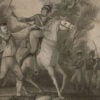This Sunday, November 9, marks the 25th anniversary of the fall of the Berlin Wall and the beginning of the end of the Soviet Union. Today, 10 nations that were once part of the Soviet Union or Warsaw Pact are NATO member states. Germany is one of the world’s strongest and freest economies—and a strong U.S. ally—and millions of people have been freed from the oppressive yoke of totalitarian communism.
On Friday, The Heritage Foundation along with the Victims of Communism Memorial Foundation will host an event assessing what lessons the fall of the Berlin Wall and the end of the Cold War still hold for free people today. With recent hostility from an aggressive, irredentist Russia, one lesson in particular is of critical importance: the value of strong, principled leadership making a consistent, forceful case as to why the path of freedom is the best choice for the people of the world.
A decade after the fall of the Berlin Wall, the late Joseph Shattan chronicled the lives of six leaders who helped the West win the Cold War in his book Architects of Victory: Six Heroes of the Cold War. Shattan described leaders as “crucial,” saying “things don’t just happen inevitably, things don’t just work out as the result of historical determinism, but that leaders make a great difference.” Leadership remains every bit as critical today in guiding the course of history as it was 25 years ago.
On Sunday, many Americans may not be aware that a quarter-century earlier, the Berlin Wall, a symbol of division and oppression, finally fell on a fateful November night, signaling the beginning of the end for the Soviet Union. It is said that those who do not learn from history are destined to repeat it. One of the lessons from the anniversary of November 9, 1989, is the importance of strong leadership in making a moral argument for freedom, democracy, and a strong national defense.






























